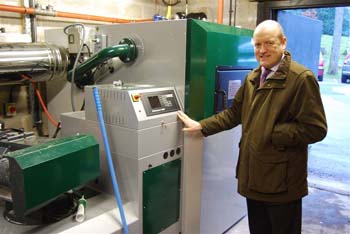Graduate's Advice Pays Off For Hotel

Lancaster University has helped a Lake District hotel reduce its carbon footprint and save around £40,000 a year with the installation of a biomass boiler. The Langdale Estate near Ambleside decided to switch from gas to the wood-burning boiler following a review by graduate consultant Ciaran Burns from the Lancaster Environment Centre.
He spent five weeks at the hotel investigating alternative energy sources such as wind and solar power before recommending the biomass boiler. The 250kw boiler is virtually carbon neutral, supplying 90% of heat for the hotel’s 22m swimming pool, sauna, solarium, two restaurants and 60 bedrooms. It will also supply the energy needs of a third of the estate’s 70 acres. The 1,000 tonnes of wood used each year are sourced locally.
Hotel manager Nick Lancaster said: “We use Lancaster University as the first port of call because at LEC there’s a huge wealth of expertise and knowledge that is great for a small local business like ourselves to tap into. It’s a very productive relationship for us and we’re very happy with the help provided.”
Ciaran Burns said the work placement was very useful in preparing him for his current job, reducing the environmental impact of a firm distributing pet foods.
He said: “I was able to find useful sources of information that I have used on several occasions in my new job and it has given me the confidence to work and produce reports individually. It looks very good on my CV, especially now that it has actually been implemented.”
Ciaran’s graduate consultancy is the first of several projects by postgraduates from LEC which have benefited the hotel. Robyn Briggs carried out a biodiversity action plan in August 2008, Vera Rexhepi created a nature trail for the Estate in December 2008 and Heather Chambers is due to start a project at Easter investigating the hydropower potential of the Estate. The graduate consultancies were organised through LEC’s Enterprise and Business Partnerships team with ERDF funding.
LEC’s Enterprise and Business Partnerships Project Officer David Ainsworth said: “The consultancies are beneficial because the students can put into practice what they’ve learned on the course in a real world situation. The benefits to companies and students have been considerable, with a high amount of positive feedback, and with some students being taken on directly by the companies that they have assisted following the completion of their degrees.”
Since the Graduate Consultancy programme began in 2003, 73 postgraduates have carried out 110 placements and 75 SMEs and larger organisations have benefited from the resulting projects.